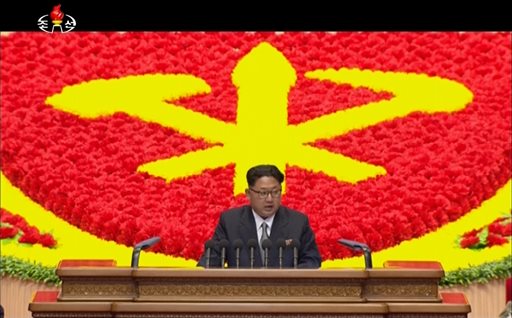-
Tips for becoming a good boxer - November 6, 2020
-
7 expert tips for making your hens night a memorable one - November 6, 2020
-
5 reasons to host your Christmas party on a cruise boat - November 6, 2020
-
What to do when you’re charged with a crime - November 6, 2020
-
Should you get one or multiple dogs? Here’s all you need to know - November 3, 2020
-
A Guide: How to Build Your Very Own Magic Mirror - February 14, 2019
-
Our Top Inspirational Baseball Stars - November 24, 2018
-
Five Tech Tools That Will Help You Turn Your Blog into a Business - November 24, 2018
-
How to Indulge on Vacation without Expanding Your Waist - November 9, 2018
-
5 Strategies for Businesses to Appeal to Today’s Increasingly Mobile-Crazed Customers - November 9, 2018
Norht Korea leader Kim says will not use nuclear arms unless threatened
North Korea will not use its nuclear weapons first unless its sovereignty is invaded, state media on Sunday, May 8, quoted Kim as saying during a critical ruling party congress. Kim also said he is ready to improve ties with “hostile” nations in a diplomatic overture in the face of worldwide pressure over its recent nuclear test and long-range rocket launch.
Advertisement
In an address to the congress of North Korea’s ruling Workers’ Party, Kim reportedly said that the North will not use a nuclear weapon unless its sovereignty is violated by aggressive hostile forces with nukes.
Ignoring United Nations resolutions aimed at curbing Pyongyang’s nuclear ambitions, Kim offered instead to “normalize” ties with nations that end their hostile attitude towards North Korea, while promising to “strive for global denuclearization”.
On the economic front, Kim declared a “five-year strategy for state economic development” from 2016 to 2020, which aims to upgrade various sectors including electricity, light industry and agriculture, though he did not elaborate on details.
On Friday, he hailed the country’s successful nuclear test and satellite launch, “boosting the country’s dignity and national power”.
While the North Korean capital has been tidied-up as part of a 70-day campaign of intensified labor ahead of the congress, the 128 members of the foreign media issued visas to cover the event had yet to be granted access to the proceedings as of Sunday afternoon.
Kim’s pledge of restraint comes at a time when the North continues to conduct nuclear weapon tests.
North Korea first tested nuclear weapons in 2006, after withdrawing from an worldwide treaty.
Market-style business has become more common in North Korea, in large part because of its economic crisis and starvation in the 1990s, which made it impossible for the government to provide its citizens with the necessities they had come to rely on and forced many to learn how to fend for themselves. “That means that (the North) would not seek denuclearization”, a senior government official told Yonhap News Agency over the phone, requesting anonymity. Worldwide sanctions imposed this year after nuclear and ballistic missile tests are expected to create additional challenges.
The U.N. sanctions, also backed by China, North Korea’s only major ally and its dominant trading partner, were in response to Pyongyang’s fourth nuclear test in January and the launch of a long-range rocket using banned missile technology a month later.
The pint-sized Pyongyang overlord also said he was willing to improve relations with nations he feels are “hostile”, including neighbouring South Korea.
The South’s Bank of Korea estimates that the North’s economy has been growing at about 1 or 2 percent a year, but analysts like Andrei Lankov, a North Korea specialist at Kookmin University in Seoul, think that its growth has been much higher, potentially as high as the 7 percent estimate from the Hyundai Economic Research Institute in Seoul.
North Korean leader Kim Jong-un speaks at a party congress in Pyongyang in a photo published by the Rodong Sinmun, North Korea’s Workers’ Party’s official newspaper, Sunday.
During the congress, Kim repeated the line that North Korea would not go on the offensive with its weapons.
Kim also proposed military talks between the two sides, saying such talks would reduce the possibility of an armed conflict at the border.
Advertisement
But Kim Jong Un has been promoting a “byungjin” – or “simultaneous pursuit” – policy under which has been trying to grow the economy at the same time as developing nuclear weapons and ballistic missiles to deliver them.





























